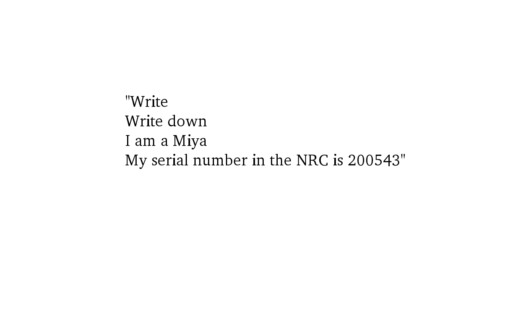Mahmoud Darwish was a young man – his recognition as Palestine’s national poet was to come decades later – when he angrily exhorted the Isreali bureaucratic state, with its endless demands for paper and documents, Write it down, I am an Arab/ My card number is 50000. Titled ID Card, the poem was a scathing, if exasperated indictment of the way in which Arabs were being robbed of their humanity, reduced to a mere number. Its searing honesty has ensured that it remains one of Darwish’s most popular poems, and explains too why his name continues to enrage the establishment in Israel.
In 2016, another young poet, in another part of the world invoked Darwish’s lines,
Write
Write Down
I am a Miya
My serial number in the NRC is 200543
Hafiz Ahmad’s poem speaks of the relentless othering and stigmatising of Bengali Muslims of Assam– the Miyas – as foreigners, outsiders, illegal, infiltrators, and now ‘termites’. It draws upon their doubtful citizenship rights and the experience of cultural and social exclusion, lawfully sanctioned, and enforced in the foreigners’ tribunals, detention camps and the updating of the national citizens’ register.
Ahmad is at the vanguard of a movement termed ‘Miya poetry’ whose language is one of resistance and remembrances – refusing the luxury of amnesia about violence such the Nellie massacre in 1983, chronicling the injustices of the present and the almost impossible struggle to prove one’s identity and belonging. Their words are not just cries of anguish, nor simply an archive of persecution. They are a gauntlet too. The taint of ‘miya’ is inverted and turned into a lyrical defiance.
This genre though deemed new, has a long ancestry, and can be traced back to Moulana Bande Ali whose 1939 poem, ‘A Charuwa’s proposition’ pointed to the banality of borders and the falsity of tests of belongingness:
Some say Bengal is my birthplace
And gloat in this bitter accusation
Well, before they came,
My father and my mother and many others
Left their homes, became country-less
How many people belonged to countries then
Who now wear the crowns and masks of leaders?
To those who doubted his rootedness in Assam, he replied:
‘The land which my Aai, Abbajan
Left for the heavens
This land is my own, my golden Assam
This land is my holy sanctuary.’
Written two years after the Nellie massacre, Khabir Ahmed’s ‘I beg to state’, seethed, ‘I am a settler, a hated Miya’, bringing ‘Miya’ into poetry. Today, it has emerged as a full fledged genre employing east Bengali dialects spoken typically by Muslims of the region mixed with a smattering of non-standard Assamese.
But this month, a clutch of police complaints were lodged against Hafiz Ahmad and ten other Miya poets, for allegedly depicting the Assamese as xenophobic and even endangering “national security”. Where the deployment of the various dialects gestures to the multiple ways of being and belonging, there is a concerted attempt to portray miya poetry is anti-Assamese. The alacrity with which these complaints have been converted into FIRs is alarming, and among the sections invoked is 153 (a) of the Indian Penal Code, i.e., inciting hatred between communities. This is a brazen attempt at silencing and criminalising poets who are articulating the life experiences of the most vulnerable.
We extend our heartfelt solidarity with Miya poets and their right to literary expression. We also demand that the FIR filed against them be withdrawn immediately.





